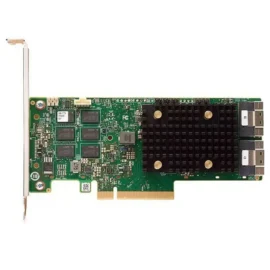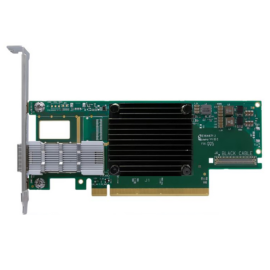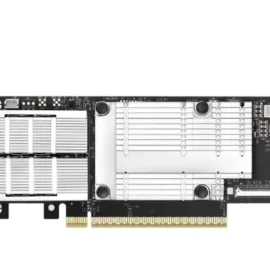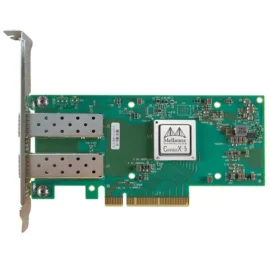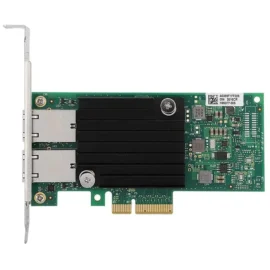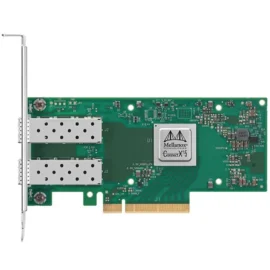In today’s fast-paced digital world, businesses, data centers, and enterprises demand faster and more efficient network infrastructure to handle the growing volumes of data. One of the critical components that have played a pivotal role in meeting these needs is the 100Gb network card. A 100Gb network card is designed to provide ultra-high-speed connectivity, supporting the growing requirements for bandwidth-heavy applications such as cloud computing, AI/ML workloads, big data analytics, and high-performance computing (HPC).
In this article, we’ll explore the importance of 100Gb network cards, their features, applications, and considerations for selecting the best solution for your network.
Table of Contents
ToggleWhat is a 100Gb Network Card?
A 100Gb network card, also known as a 100Gb Ethernet card or 100 Gigabit Network Interface Card (NIC), is a hardware component that allows a computer or server to communicate over a network at speeds of up to 100 gigabits per second (Gbps). This speed is significantly higher than traditional Ethernet cards, which typically operate at 1Gbps, 10Gbps, or 40Gbps, and offers immense bandwidth for data-heavy applications.
The 100Gb NICs are typically used in data centers, enterprise IT networks, and other environments that require high throughput for tasks such as virtualization, storage networking, and running large-scale applications.
Key Features of a 100Gb Network Card
- High-Speed Data Transfer
The primary feature of a 100Gb network card is its ability to handle speeds of up to 100Gbps. This enables extremely fast data transfer, which is essential for modern applications requiring low latency and high throughput. - Low Latency
100Gb network cards are designed to minimize latency, which is crucial for applications such as video streaming, real-time data analysis, and financial trading. Lower latency ensures that data is transmitted without delays, improving the overall efficiency of the network. - Scalability
A 100Gb NIC can support scalable network configurations, making it ideal for environments where network performance needs to grow rapidly to meet increasing demands. These cards can be used in conjunction with multiple interfaces or switches to scale up the network bandwidth. - Support for Modern Standards
Many 100Gb network cards support various protocols such as RDMA (Remote Direct Memory Access), Ethernet, Fibre Channel, and iSCSI. These protocols enhance the functionality of the card by supporting storage networking, faster memory access, and better resource utilization. - Compatibility
100Gb network cards are compatible with a wide range of devices, including servers, storage systems, and networking equipment. Additionally, they often come with backward compatibility, meaning they can support older networking speeds, such as 10Gbps and 40Gbps, depending on the infrastructure. - Energy Efficiency
While providing blazing-fast speeds, modern 100Gb network cards are also designed to be energy efficient. With the ever-growing demand for high-speed networks, minimizing power consumption while ensuring high performance is an essential feature for data centers.
Applications of 100Gb Network Cards
- Data Centers
Data centers are among the primary users of 100Gb network cards. These facilities rely on high-speed connectivity to support large-scale data storage, cloud services, and enterprise applications. The ability to support 100Gbps speeds ensures data centers can meet the growing demand for bandwidth and deliver seamless services. - High-Performance Computing (HPC)
HPC systems are built for processing complex calculations and simulations at incredibly high speeds. A 100Gb network card ensures that data can be transferred between high-performance servers and storage systems quickly, enhancing overall system performance in scientific research, engineering, and AI modeling. - Artificial Intelligence and Machine Learning
AI and ML workloads require vast amounts of data to be processed rapidly. The high-speed data transfer capabilities of a 100Gb network card are essential for enabling fast data access and real-time analytics, which is key to training sophisticated models in AI and machine learning. - Telecommunications
Telecommunications companies, particularly those providing 5G services, require 100Gb network cards to manage vast amounts of data traffic and ensure that their infrastructure can handle peak loads with low latency. These cards help support the high-speed communication needed for next-gen mobile networks. - Storage Area Networks (SAN)
Storage Area Networks rely on high-bandwidth solutions to manage data storage and backup tasks efficiently. 100Gb network cards are used in SAN systems to provide high-speed connectivity for storage arrays, ensuring that data is transferred with minimal latency and maximum throughput.
Considerations When Choosing a 100Gb Network Card
- Compatibility with Existing Infrastructure
It’s essential to check if your existing network infrastructure (switches, routers, and cabling) supports 100Gbps speeds. Upgrading to a 100Gb network card might require additional upgrades to other components in the network. - Number of Ports
Depending on your network setup, you may need to choose a 100Gb network card with multiple ports to handle different data streams or configurations. Many high-end network cards offer dual-port or quad-port solutions, allowing for more flexibility. - Network Protocol Support
Ensure that the network card supports the necessary protocols for your applications, whether it’s standard Ethernet, RDMA, Fibre Channel, or iSCSI. The right protocol will ensure seamless integration with your infrastructure. - Latency Requirements
For mission-critical applications, minimizing latency is essential. Ensure the selected 100Gb NIC has low-latency features to avoid bottlenecks or delays in data transmission. - Cost Considerations
While 100Gb network cards offer immense performance benefits, they can also be expensive. It’s important to evaluate whether the investment aligns with your business needs and whether your infrastructure is ready to handle the increased speed and associated costs.
Popular 100Gb Network Cards
Some of the leading manufacturers offering high-performance 100Gb network cards include:
- Mellanox Technologies: Known for their InfiniBand and Ethernet adapters, Mellanox cards offer high throughput and low latency.
- Intel: Intel’s Ethernet Network Adapters, such as the Intel Ethernet 800 Series, provide robust performance for a variety of network-intensive applications.
- Broadcom: Known for their advanced networking solutions, Broadcom offers 100Gb NICs with cutting-edge features for data centers and enterprise networks.
- Cisco: Cisco’s Nexus series and network interface cards deliver reliable and scalable solutions for high-performance networks.
Conclusion
As data requirements continue to skyrocket, 100Gb network cards are becoming essential for businesses and data centers that demand ultra-fast and reliable network performance. From high-performance computing and AI to storage networking and cloud computing, these cards are at the forefront of next-gen infrastructure.
When choosing a 100Gb network card, businesses need to consider factors like compatibility, protocol support, and network infrastructure readiness to ensure they can fully leverage the power of 100Gbps speeds. With the right solution in place, organizations can meet the demands of modern digital transformation and stay ahead in an increasingly data-driven world.

